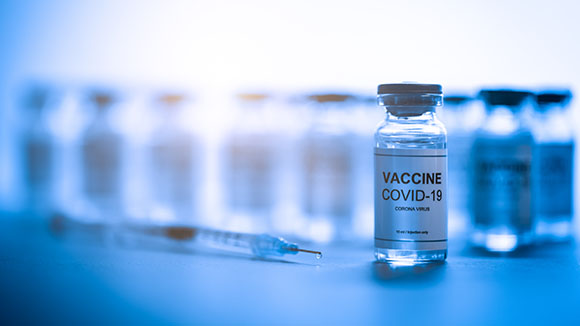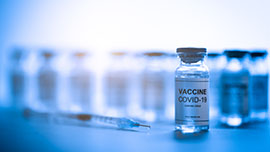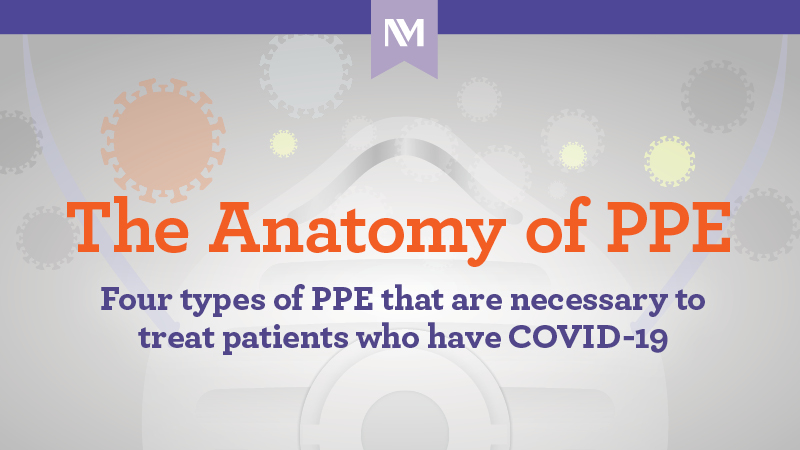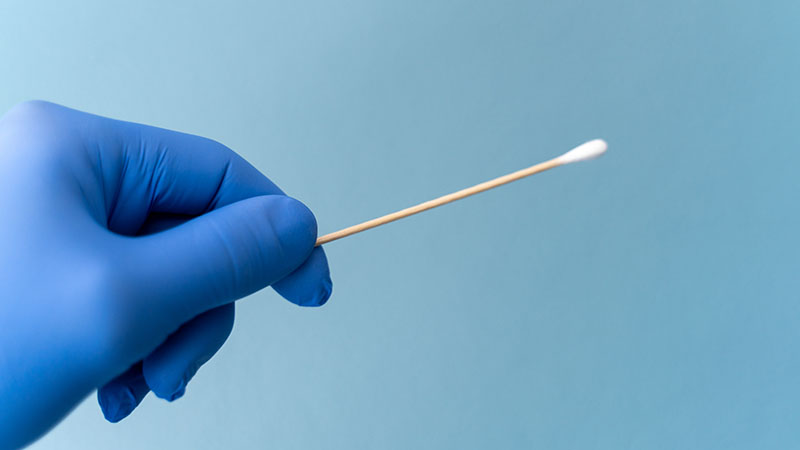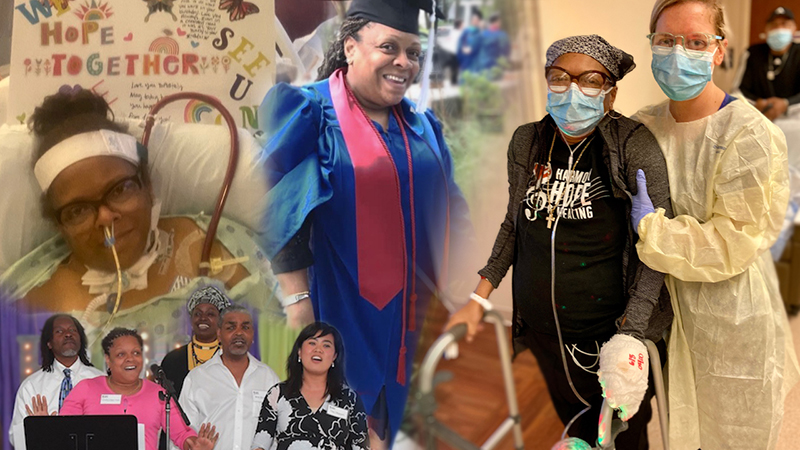Infectious Disease Specialist Answers Your COVID-19 Vaccine Questions
Plus, Why He Got Vaccinated
Updated August 2021
"As a medical professional who has spent a majority of my career focused on infectious disease and respiratory viruses, I received a COVID-19 vaccine as soon as it was offered to me at Northwestern Medicine," shares Michael G. Ison, MD, infectious diseases and organ transplantation specialist at Northwestern Medicine. "I chose to get a vaccine because the research suggests it will protect me."
Here, Dr. Ison answers the most commonly asked questions about COVID-19 vaccines.
NOTE: As clinical trials expand upon data around vaccine safety and efficacy, the Centers for Disease Control and Prevention (CDC) provides the most up-to-date evidence-based recommendations.
How do the mRNA COVID-19 vaccines work?
I chose to get a vaccine because the research suggests it will protect me.— Michael G. Ison, MD
Many other vaccines send a weakened or inactivated version of a virus into your body. However, the Pfizer-BioNTech and Moderna COVID-19 vaccines deliver a version of the COVID-19 genetic code, called messenger RNA (or mRNA), into your cells.
- mRNA tells your cells to make a harmless protein called a "spike protein." It is similar to what is found on SARS-CoV-2, the virus that causes COVID-19.
- Next, your body destroys the vaccine material.
- Your immune system will know that the cells with the spike protein don't belong in your body. It will see them as intruders, or "antigens."
- Then your body will develop "antibodies," which act as soldiers to destroy antigens.
Thanks to the vaccine, your immune system's "memory cells" now know how to make these antibodies. So, if you are exposed to the SARS-CoV-2 virus in the future, your body will be able to help keep you from getting sick with COVID-19.
How does the Johnson & Johnson vaccine work?
The Johnson & Johnson vaccine is a one-dose viral vector vaccine. Scientists began creating viral vectors in the 1970s. Since then, hundreds of scientific studies have been published on them, and a number of human clinical trials have been conducted.
A viral vector vaccine uses a weakened version of a different virus to act as a messenger that delivers instructions to your cells. The Johnson & Johnson vaccine uses the adenovirus. These instructions are carried by a gene that is specific to the SARS-CoV-2 virus.
Like mRNA vaccines, this viral vector vaccine:
- Teaches cells to build a spike protein on the cell surface, which triggers an immune response.
- Is destroyed by your body after the spike protein is created.
- Cannot cause COVID-19 (the adenovirus used in the vaccine cannot make new viruses).
- Does not alter your DNA.
Are the two mRNA vaccines from Pfizer-BioNTech and Moderna interchangeable?
Both vaccines require two doses, but you should receive the same vaccine for each dose. For example, you cannot get one dose of the Pfizer-BioNTech COVID-19 vaccine followed by one dose of the Moderna COVID-19 vaccine. The safety of mixing the two vaccines has not been evaluated. The CDC and Northwestern Medicine recommend vaccination with any COVID-19 vaccine available to you in the U.S. and do not recommend one COVID-19 vaccine over another.
What are the benefits of getting a COVID-19 vaccine?
The COVID-19 vaccines offer excellent protection against the virus. For people who do get infected despite vaccination, the disease is generally mild. In almost all cases, people who are vaccinated avoid serious illness, hospitalization and death from COVID-19.
Vaccination also reduces your ability to spread the illness to others. So even if you think you might not get very sick with COVID-19, by choosing to get vaccinated, you are helping protect your loved ones and your community.
Who should and should not get vaccinated?
Vaccination is key to ending the COVID-19 pandemic. The goal is for everyone who is eligible to be vaccinated.
At this time:
- People ages 12 and older can receive the Pfizer-BioNTech COVID-19 vaccine.
- People ages 18 and older can receive the Moderna COVID-19 vaccine or the Johnson & Johnson COVID-19 vaccine.
According to the American College of Obstetricians and Gynecologists, people who are pregnant or breastfeeding should get vaccinated against COVID-19. While studies are ongoing, current data shows that vaccine is safe for them and their babies.
Talk to your primary care physician to weigh the risks and benefits as outlined by the Food and Drug Administration (FDA) if any of the following apply to you:
- You have HIV infection or another immunocompromising condition
- You have any allergies
- You have a fever
- You have a blood disorder or are on a blood thinner
- You have already received a different COVID-19 vaccine
What if I have allergies?
According to the CDC, those who have had severe reactions to other vaccines or injectable drugs are still approved to receive any of the COVID-19 vaccines. Patients who have allergies and get vaccinated will need to be monitored for 30 minutes following vaccination, compared to patients without allergies who will be monitored for 15 minutes.
How many doses do I need to get?
You should receive two doses of the Pfizer-BioNTech or Moderna COVID-19 vaccine.
- For the Pfizer-BioNTech vaccine, the second dose should be given 21 days after the first.
- For the Moderna vaccine, the second dose should be given 28 days after the first.
The Johnson & Johnson vaccine requires one dose.
Can COVID-19 vaccines give me COVID-19?
You cannot get COVID-19 from any COVID-19 vaccines. The vaccines do not contain the virus that causes COVID-19, so there is no way for you to get infected through vaccination.
Are there side effects of COVID-19 vaccines?
Side effects are similar to what you might experience with other vaccines. The most common side effects are mild, and include fatigue, headache, fever and chills. These side effects may occur as a result of your body's work to create immunity to the virus and are a sign that the vaccine is working. Such side effects should go away within a few days.
Please note that some people will not have any side effects, and some people may experience significant side effects. It is advised to consult your provider if:
- You are experiencing any side effects for more than a few days.
- You notice that the area where you received the vaccine increases in redness or tenderness over 24 hours.
- You become worried by your side effects.
The CDC recommends that patients report any side effects via V-safe, a smartphone-based tool.
Serious side effects from COVID-19 vaccination, which the CDC calls adverse events, have been reported, but they are extremely rare. You are much more likely to become seriously ill from COVID-19 than you are to experience one of these adverse events.
Can I get a COVID-19 vaccine at the same time as my flu vaccine?
Yes. You can get a COVID-19 vaccine at the same time as other vaccines.
If I have had COVID-19 and/or tested positive for antibodies to the virus that causes COVID-19, do I need the vaccine?
According to the CDC, more research is needed to determine how long patients who have recovered from COVID-19 will be protected by natural immunity. Therefore, even if you have had COVID-19 or positive detection of antibodies, data shows the COVID-19 vaccine will likely benefit you: It could boost your natural immunity or build immunity if your natural immunity has decreased over time.
Note that if you were treated for COVID-19 with monoclonal antibodies or convalescent plasma, you should wait 90 days before getting a COVID-19 vaccine. If you are not sure what treatments you received during your illness, talk to your physician.
How long should I wait to get vaccinated if I believe I am exposed to COVID-19? Should I get tested for COVID-19 first?
It is advised that you wait at least until you are no longer required to isolate or quarantine before getting the COVID-19 vaccine. At this time, it is not recommended to get tested for COVID-19 before getting vaccinated.
Can I spread COVID-19 once I receive a COVID-19 vaccine? Do I still need to wear a mask?
Once you have been vaccinated, you should continue behaving as though you have not been vaccinated: Wear a mask, maintain physical distance and wash your hands.
- Vaccines are not 100% effective. It is still possible for you to get and spread the disease after vaccination. Vaccination makes it less likely that you will get sick and helps protect you against serious illness, hospitalization and death.
- Vaccines may take a week or two to help your body build immunity, so you could still become infected before your immune system is able to protect you.
Use all tools available to you to protect both yourself and others from COVID-19.
Is vaccination covered by my insurance?
The federal government has indicated that every person in the U.S. should be able to be vaccinated with no out-of-pocket expense, regardless of insurance coverage. Your insurance provider may be billed to cover the cost to administer the vaccine.
COVID-19 vaccines are supplied by state and local agencies. Not all vaccine types are offered at all locations. Learn more about the current vaccination plan at Northwestern Medicine.
Patients at Northwestern Medicine can learn about our vaccination plan on our COVID-19 Vaccine page. Prepare yourself for vaccination by reading more about the benefits of getting vaccinated and the science behind vaccines.

